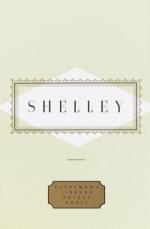124 [1. The Author was pursuing a fuller development of the ideal character of Athanase, when it struck him that in an attempt at extreme refinement and analysis, his conceptions might be betrayed into the assuming a morbid character. The reader will judge whether he is a loser or gainer by this diffidence. [Shelley’s Note.] Footnote diffidence cj. Rossetti (1878); difference editions 1824, 1839.]
154 beneath editions 1824, 1839; between Bodleian
manuscript. 165 One Bodleian manuscript edition
1839; An edition 1824. 167 Thus thro’ Bodleian
manuscript (?) edition 1839; Thus had edition 1824.
173 talk they edition 1824, Bodleian manuscript;
talk now edition 1839. 175 that edition 1839; the
edition 1824. 182 So edition 1839; And edition
1824. 183 Or on Bodleian manuscript; Or by editions
1824, 1839. 199 eve Bodleian manuscript edition
1839; night edition 1824. 212 emotion, a swift
editions 1824, 1839;
emotion with swift Bodleian
manuscript.
250 under edition 1824, Bodleian manuscript; beneath
edition 1839. 256 outstrips editions 1824, 1839;
outrides Bodleian manuscript. 259 Exulting, while
the wide Bodleian manuscript. 262 mountains editions
1824, 1839; crags Bodleian manuscript. 264 fountains
editions 1824, 1839; springs Bodleian manuscript.
269 chasms Bodleian manuscript; chasm editions 1824,
1839. 283 thine Bodleian manuscript; thy editions
1824, 1839. 285 Investeth Bodleian manuscript;
Investest editions 1824, 1839. 289 light Bodleian
manuscript; bright editions 1824, 1839.
***
ROSALIND AND HELEN.
A MODERN ECLOGUE.
[Begun at Marlow, 1817 (summer); already in the press, March, 1818; finished at the Baths of Lucca, August, 1818; published with other poems, as the title-piece of a slender volume, by C. & J. Ollier, London, 1819 (spring). See “Biographical List”. Sources of the text are (1) editio princeps, 1819; (2) “Poetical Works”, edition Mrs. Shelley, 1839, editions 1st and 2nd. A fragment of the text is amongst the Boscombe manuscripts. The poem is reprinted here from the editio princeps; verbal alterations are recorded in the footnotes, punctual in the Editor’s Notes at the end of Volume 3.]
ADVERTISEMENT.
The story of “Rosalind and Helen” is, undoubtedly, not an attempt in the highest style of poetry. It is in no degree calculated to excite profound meditation; and if, by interesting the affections and amusing the imagination, it awakens a certain ideal melancholy favourable to the reception of more important impressions, it will produce in the reader all that the writer experienced in the composition. I resigned myself, as I wrote, to the impulses of the feelings which moulded the conception of the story; and this impulse determined the pauses of a measure, which only pretends to be regular inasmuch as it corresponds with, and expresses, the irregularity of the imaginations which inspired it.




